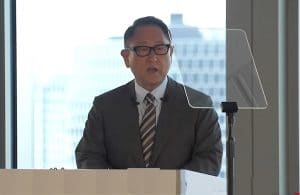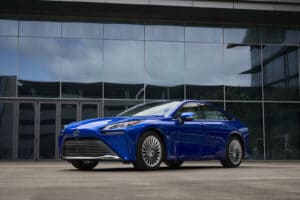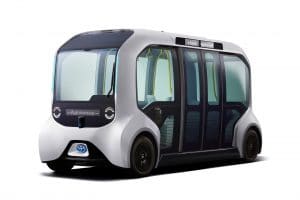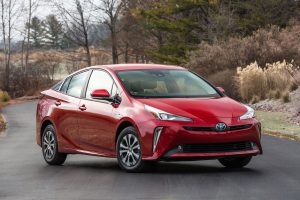
So far this month, Toyota Motor Corp. has announced plans for two new battery-electric vehicles – but it doesn’t appear the automaker’s President, Akio Toyoda, has warmed to the industry’s accelerating shift away from internal combustion engines.
Despite Toyota’s pioneering role in the development of hybrid technology, the exec – the grandson of the automaker’s founder – believes battery-electric vehicles are not only overhyped but also could cause “the current business of the car industry … to collapse.”
Toyota did introduce a low-volume, battery-electric vehicle in Europe this year and, earlier this month, laid out plans to add another model under the Toyota brand, as well as one to be sold by its Lexus luxury franchise. But the company has no interest in matching the pace of BEV development announced by key rivals like General Motors and Volkswagen and, during a year-end news conference held by the Japan Automobile Manufacturers Association, Toyoda explained why.
(Toyota goes “all-hybrid” with new Venza, Sienna models.)

The 64-year-old executive laid out a variety of complaints during his comments, delivered under his role as JAMA chairman. They included the high cost of BEVs as well as questions about their perceived benefits to the environment.
In Japan alone, said Toyoda, there simply is not enough electricity to go around, especially during Japan’s sweltering summers. To bulk up that country’s infrastructure, he estimated, would cost between 14 trillion and 37 trillion yen, or $135 billion to $358 billion.
Until a decade ago, Japan might have generated the necessary energy by adding more nuclear capacity but, since the Fukushima plant meltdown in 2011, the country has focused on burning coal and natural gas.
“The more EVs we build, the worse carbon dioxide gets,” said Toyoda, “When politicians are out there saying, ‘Let’s get rid of all cars using gasoline,’ do they understand this?”
While Toyota may be one of the largest and most influential automotive brands in the world, its ongoing skepticism about EVs has done little to slow down momentum. General Motors, for one, announced last month it will increase

spending 35%, to $27 billion by 2025, at which point it plans to have 30 all-electric models on the market. Its original target was 20 or more by 2023. Even exotic players are shifting gears, Bentley last month saying it will be all electric by late in the decade.
(Tesla now worth more than all Japanese automakers, but Toyota’s CEO isn’t impressed.)
Growing sales are helping steer industry strategy. But so are the new regulations being put in place around the planet. The United Kingdom moved ahead to 2030 a ban on the sale of new vehicles using internal combustion engines and reports from Japan say the government there may announce a similar goal by 2035. California, one of Toyota’s biggest markets, has outlined its own ban, as have numerous cities such as London, Paris, Berlin and Mexico City.
But Toyoda warned that the price premium for battery technology could make electric vehicles the equivalent of a “flower on a high summit,” costing more than the average motorist can afford.
That position may reflect current realities, but battery prices are tumbling and analysts at firms like the Boston Consulting Group have forecast that parity between gas-powered vehicles and those running on battery power should come during the latter third of the decade.

Ironically, Toyota’s own development program could play a key role in driving down costs. According to a recent report by the Nikkei news service, the automaker is to soon announce the results of its solid-state battery development program. That technology is expected to slash costs, improve range and cut charging times, three key obstacles to wider adoption of BEVs.
Toyota, meanwhile, has become a major proponent of hydrogen technology, this month launching sales of its second-generation Mirai fuel-cell vehicle. FCVs are even costlier than battery-based models and the infrastructure to distribute hydrogen is, for now, virtually non-existent.
(Toyota hopes to boost interest in hydrogen tech with second-generation Mirai.)
Despite the skepticism of Toyota’s president, the industry giant has a significant program aimed at electrification, with more than $13 billion committed through the rest of the decade. A large chunk of that will continue to be earmarked for conventional hybrids, as well as plug-in hybrids, however. Toyota recently reconfirmed plans to have electrified versions of essentially all model-lines before mid-decade, with a goal of selling 4.5 million hybrids and 1 million BEVs by no later than 2030.







